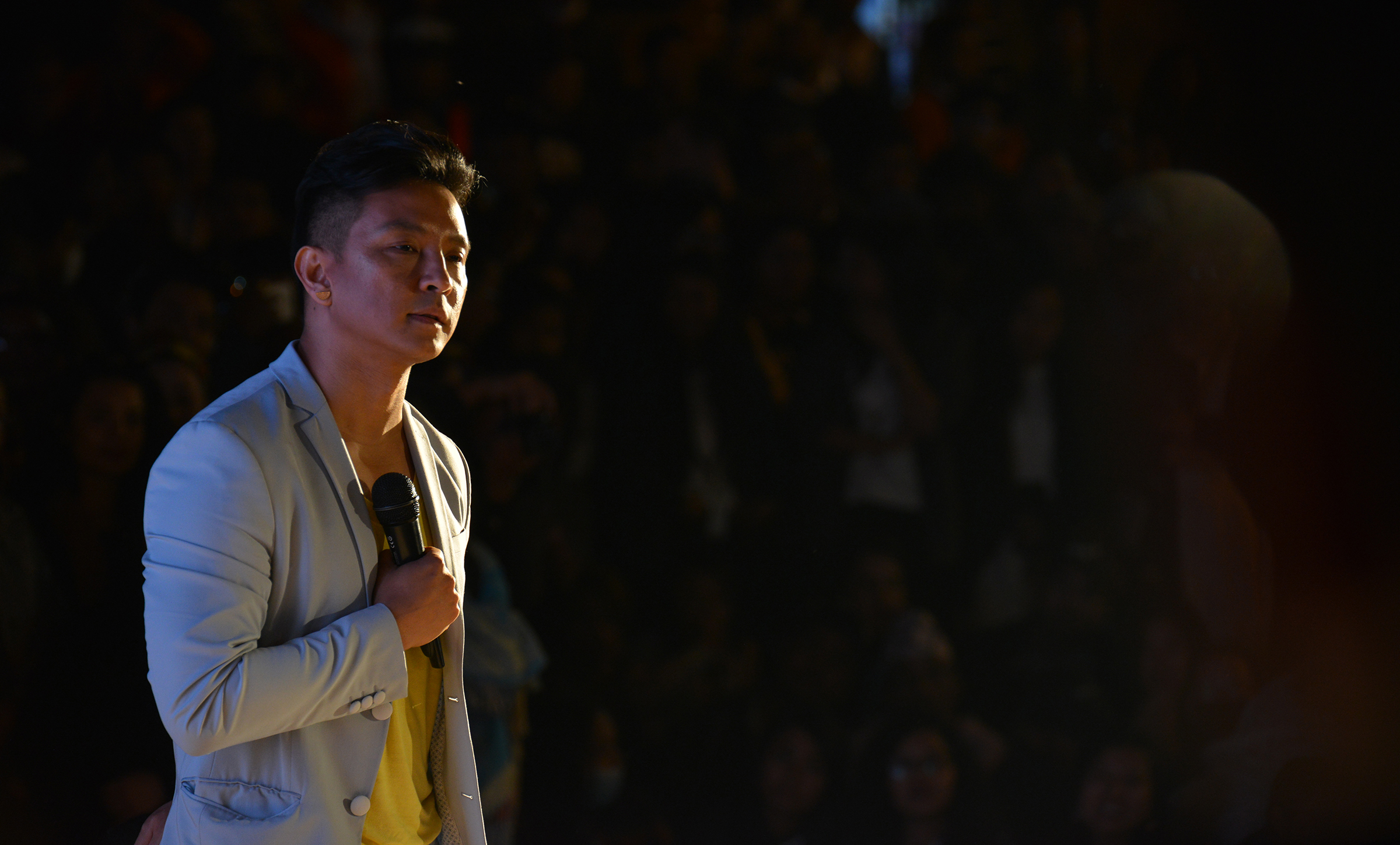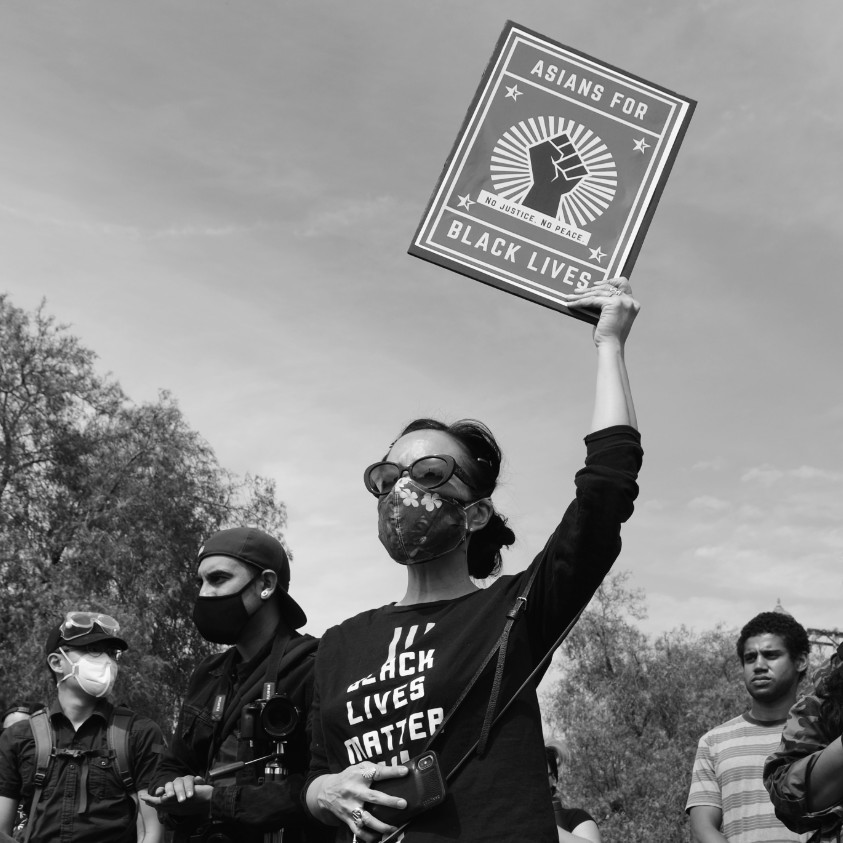Prabal Gurung is urging Asian-Americans to shed the “model minority” myth and stand up for the Black community following the death of George Floyd, a Black man who died on May 25 in police custody at a Minnesota hospital following a brutal police assault that was captured in a bystander video, which showed a white Minneapolis Police officer named Derek Chauvin kneeling on Floyd’s neck as Floyd shouts, “I can’t breathe.”
In an op-ed for the Washington Post, the Nepalese-American fashion designer explained why the Asian community should stand in “stand in solidarity with Black communities whose sacrifices led to the civil rights and privileges we benefit from.”
Gurung said that he felt a “responsibility to help cultivate solidarity between Black and Asian communities” after seeing Tou Thao, one of the three officers present during the police assault stand with his back turned while Chauvin knelt on Floyd’s neck. Thao, who is Hmong American, has since been described by activists as a symbol of Asian American complicity in anti-blackness, a sentiment that Prabal agreed with.
“Though Thao’s knee was not on Floyd’s neck, he was an active participant in his death,” wrote Gurung. “Just as Officer Jared Yeun, who antagonized protesters in San Jose, is a participant in the abuse of power by the police. Just as many in the Asian American community — now the fastest-growing racial and immigrant group in the United States — have been an accessory in the anti-blackness that is woven into the DNA of America.”
He continued, “We cannot perpetuate the narrative that the colonists put forward, which says that minority groups shouldn’t get along. To end this narrative in the fight toward equality, we have to hold members of our community like Thao and Yeun accountable.”
Along with holding members of the community accountable, Prabal says in order to cultivate solidarity, we must confront our own anti-Blackness, which the designer says is rooted in the “model minority” myth as well as the overarching philosophy of Asian culture to revere and respect our elders by not speaking out or being disruptive.
“Asian Americans have collectively distanced ourselves from Black and other marginalized communities in an attempt to protect our own security and belonging,” he wrote. “We’re taught that if we want to succeed in this country, we should not align ourselves with those that are on the ‘bottom’ but to align with the dominant culture — that proximity to whiteness will keep us safe.”
He noted that anti-Blackness can take many forms: “It’s the off-colour comment our auntie makes at the dinner table, but would never dare say in public. It’s the fearful mistrust with which we sometimes treat our black neighbours.”
However, he acknowledged that this “protective” model minority label has proven to not to serve Asian Americans in times of uncertainty, particularly, during the global pandemic of the coronavirus, which prompted hate crimes against the Asian American community (and was dubbed the “China virus” by President Trump).
“If we can be scapegoated with terms like ‘China virus’ and dehumanized through heinous hate crimes the moment things get rough, then white America never really thought we belonged in the first place,” he wrote.
Asian Americans have collectively distanced ourselves from Black and other marginalized communities in an attempt to protect our own security and belonging. We’re taught that if we want to succeed in this country, we should not align ourselves with those that are on the ‘bottom’ but to align with the dominant culture — that proximity to whiteness will keep us safe.
It is for this reason Gurung says the Asian community should stand with Black communities to show American that we are “more than a ‘well-behaved’ and complicit trope.”
“Who benefits when minority groups fight each other or are apathetic to one another’s struggles? The colonists are the ones who have been advantaged by our decades-long burden of being othered, of being divided,” he wrote.
He urged the Asian American community to witness, name and unlearn anti-Blackness, and to have those “uncomfortable conversations” with family members who may not understand.
“We can no longer afford to be comfortable, only practicing activism in spaces where we know people will agree with us. We have to be loud and get uncomfortable to be truly effective,” he wrote.
“Now is the time for action. We have to demand change, and demand that police brutality and the flagrant and systemic disregard for Black lives stops. Humanity is not tied to one person, place, gender or race. Black Lives Matter; our liberation is bound together and we must turn our segregated oppression into a collective resistance.”
We can no longer afford to be comfortable, only practicing activism in spaces where we know people will agree with us. We have to be loud and get uncomfortable to be truly effective.
This isn’t the first time Prabal has been vocal about race or politics — the Washington Post once dubbed the Singapore-born designer the “most woke man in fashion” due to his tendency to speak up about current events, politics and social justice, and his use of fashion, particularly his runway shows, to highlight important issues.
“For me, being an activist is part of my identity,” he told Refinery29 following his spring/summer 2020 show at New York Fashion Week which explored American identity. “Under our current administration, we are living in a dangerous and divisive time. We have to make a decision to be on the right side of history.”
The New York-based designer attended protests as part of the Black Lives Matter movement on June 2nd at Washington Square Park and Stonewall Inn in New York, sharing videos and photos of the protests on his Instagram page.
Additionally, Prabal relaunched his “Stronger in Colour” collection, consisting of a T-shirt and hoodie with his signature phrase with 100% of the net proceeds donated to The Bail Project, hich is presently focused on combatting the mass incarceration disproportionately affecting the Black community.
Allyship
“How to Be a Good Ally to Your Black Friends“ — Friday Things
“20+ Allyship Actions for Asians to Show Up for the Black Community Right Now” — Michelle Kim
“South Asians and Black Lives” — Deepa Iyer
“A Quick Guide to: Supporting Black Lives as Non-Black Asian/Pacific American” (Instagram Infographic) — Hannah Qin
“Things That Get in the Way of Being an Effective Ally: An Honest Reflection from a Non-Black POC” (Instagram Infographic) — Jack Lam
Recognizing and Acknowledging Our Own Biases and Racism
“Asians4BlackLives in 2020” — Leena Yin 殷月蕾
“Protests Against Racism: Police Brutality Happened Around the World this Weekend After Police Killed George Floyd” — LaineyGossip
“Learning to Be Anti-Racist” (Instagram Infographic) — Jack Lam
Talking to Your Parents About Black Lives Matter
“Explaining BLM to Asian Parents: A Difficult Conversation“ (Instagram Infographic) — Michelle Tam
Letters for Black Lives (2016 edition, 2020 edition in the works) — Set of crowdsourced, multilingual, and culturally-aware resources aimed at creating a space for open and honest conversations about racial justice, police violence, and anti-Blackness in our families and communities.
Call On Me, Not the Cops — Pre-written letter (in numerous languages) to help have conversations with family members on why we must stop calling the police.
Donate
CANADA
Black Women in Motion (Toronto) — Toronto-based, survivor-led organization that empowers and supports the advancement of black womxn and survivors of sexual violence.
Black Legal Action Centre (Ontario) — Non-profit community legal clinic that provides free legal services for low or no income Black residents of Ontario.
Black Youth Helpline (Nation-wide) — Focuses on community development and support for Black youth across Canada.
Black Lives Matter Toronto — Aims to :forge critical connections and to work in solidarity with black communities, black-centric networks, solidarity movements, and allies in order to to dismantle all forms of state-sanctioned oppression, violence, and brutality committed against African, Caribbean, and Black cis, queer, trans, and disabled populations in Toronto.”
Black Lives Matter Vancouver — Black folks & allies working in solidarity with communities seeking justice from racialized violence.
Black Health Alliance (Nation-wide)— Community-led registered charity working to improve the health and well-being of Black communities in Canada.
Canadian Association of Black Journalists (Nation-wide) — Strives to advance the work of Black journalists and media professionals in Canada.
AMERICA
The Bail Project — Helps post bail for people who can’t afford it. Aims to combat mass incarceration and reshape the pretrial system in the U.S.
Black Visions Collective — Dedicated to Black liberation and to collective liberation.
Black Lives Matter — Aims to end state-sanctioned violence, liberate Black people and end white supremacy forever.
Master list of other ways to donate (with or without monetary funds)









